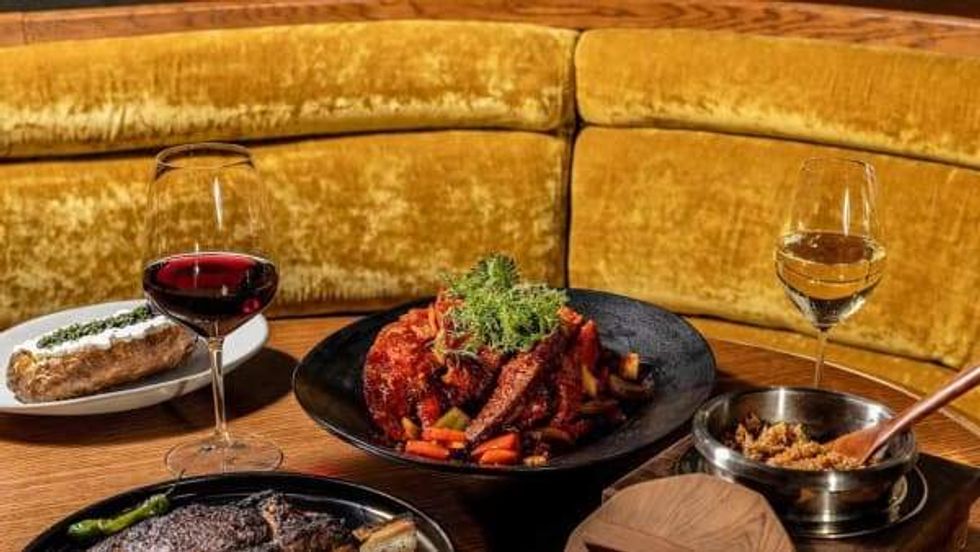Convenience Store News
7-Eleven and convenience stores across U.S. ramp up food offerings

7-Eleven is going beyond the Slurpee.
Americans who think of petrified hot dogs, frozen burritos, and salty snacks when they imagine getting food at a gas station or truck stop may be pleasantly surprised during their next road trip: U.S. convenience stores are offering them more and better — though not necessarily healthier — choices.
From 7-Eleven to regional chains like QuikTrip, the operators of c-stores, as they're known in the trade, are looking overseas for grab-and-go inspiration, adding sit-down seating at some locations, expanding their coffee menus to rival Starbucks and experimenting with made-to-order meals for busy families.
The moves are happening as convenience stores seek ways to offset slowing sales of cigarettes, maps, and soft drinks. By tempting customers’ palates with fresh deli sandwiches and build-your-own burgers, the humble food marts want to become an alternative to fast-food restaurants for busy Americans who crave easy, interesting and less expensive eating options.
“It has been a decades-long journey to go from food that was perceived as desperation to destination,” Jeff Lenard, vice president of strategic industry initiatives for the National Association of Convenience Stores, said.
In keeping with their quest, convenience stores are expanding delivery services to build on a customer base they found during the COVID-19 pandemic. 7-Eleven plans to take its 7Now delivery app nationwide, allowing users to have pizza, the chain's signature Slurpees and thousands of other items brought to their doors.
The nation's largest convenience store chain, owned by Japanese company Seven & i Holdings, offers select Japanese items like chicken teriyaki, rice balls, miso ramen and sweet chili crisp wings at some U.S. locations and at its recently acquired Speedway and Stripes stores. Visitors to Japan and Hawaii often respond with envy and astonishment when they taste what’s on offer at a 7-Eleven in Tokyo or Honolulu.
The chain's North American subsidiary said it works with some of the same food manufacturers and commissaries that serve Seven-Eleven Japan. That includes Warabeya, which is expanding its U.S operations to help deliver fresh food to stores and provide an assortment of offerings to suit regional tastes.
“Our team draws inspiration from around the world to introduce new items like mangonada donuts with Tajín, barbecue pork sliders, chicken curry bowls and everything breakfast sandwiches," the subsidiary said in a statement after declining interview requests.
Seven & i Holdings disclosed earlier this month plans to close 444 U.S. locations amid slowing sales, inflationary pressures and an accelerated decline in cigarette purchases. The company also is fielding a buyout offer from Alimentation Couche-Tard, the Canadian owner of the Circle K convenience stores.
Appealing convenience store food isn't entirely new and has varied widely by region. Buc-ee’s, the Texas-born chain with 50 stores in the South, has a cult following among fans who regularly stop for breakfast tacos and snacks like caramel-coat corn puffs called Beaver Nuggets.
Pennsylvania residents, meanwhile, happily debate the relative culinary merits of the food from Wawa (Try the Gobbler, a hot turkey sandwich with stuffing, gravy, and cranberry sauce, they advise), Sheetz (the expansive menu of hot and customizable food includes breakfast bagels and quesadillas) and Landhope Farms, beloved for its hand-dipped ice cream cones and milkshakes.
TikTok and YouTube videos of people eating nothing but convenience store food for a day or comparing the dishes from different chains have helped drive interest in food on the road.
The coronavirus created a unique role for the sector. Most restaurants closed temporarily at the height of the pandemic, while many convenience stores remained open.
Non-fuel sales at U.S. convenience stores increased 36% between pre-pandemic 2018 and last year, growing from $242 billion to almost $328 billion, according to a National Association of Convenience Stores analysis of sales data from roughly 20,000 locations. During the same period, cigarettes as a percentage of those sales fell from 31% to 20%.
In upping their food offerings, convenience stores now threaten to take business from fast-food chains like McDonald’s, Burger King and Wendy’s, which used summer deals to revive sales, experts said.

 Zodiac Room popovers. Photo courtesy of Lisa Crossett
Zodiac Room popovers. Photo courtesy of Lisa Crossett  Salad and Go is going going gone. Photo by Salad and Go
Salad and Go is going going gone. Photo by Salad and Go  Blue Bell Classic Pecan Pie ice cream. Blue Bell
Blue Bell Classic Pecan Pie ice cream. Blue Bell  Nuri Steakhouse ranked 84th on the list. Photo courtesy of Nuri
Nuri Steakhouse ranked 84th on the list. Photo courtesy of Nuri